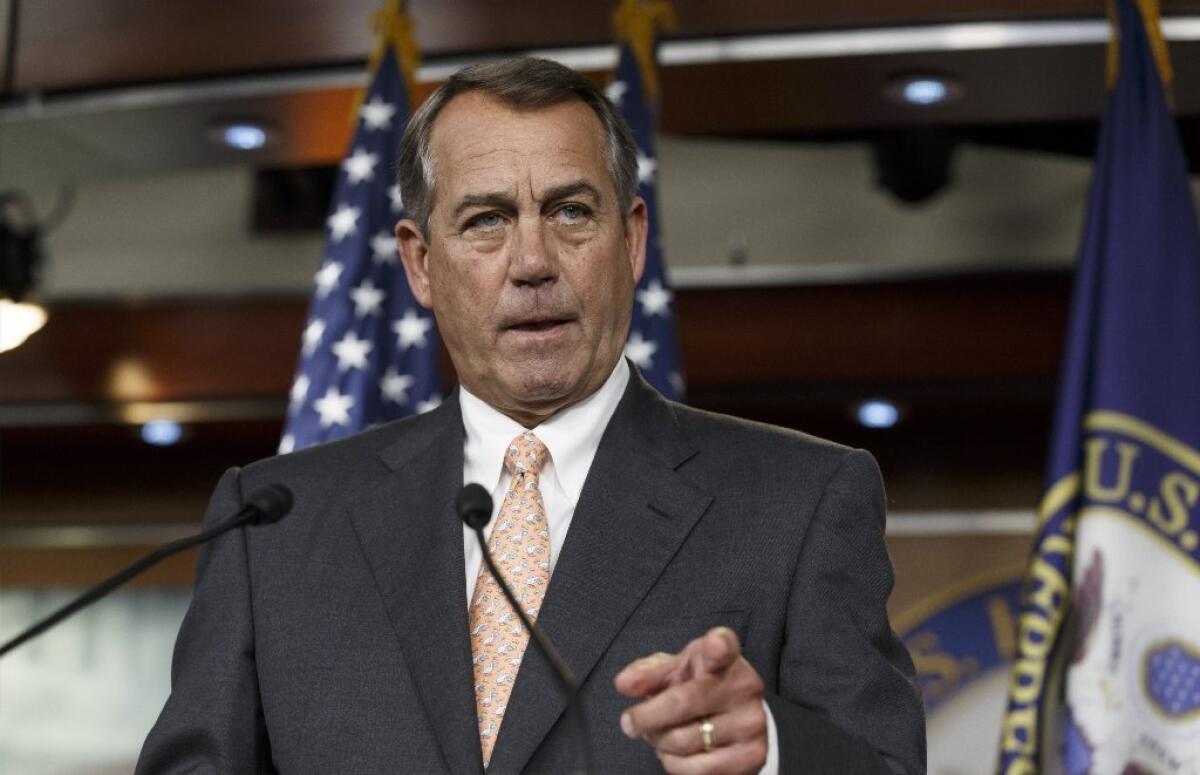Editorial: Quit playing games with Benghazi

- Share via
The deaths of four Americans — including Ambassador J. Christopher Stevens — in Benghazi, Libya, in September 2012 was a tragic (though sadly not unprecedented) loss of life as well as an indictment of security measures at the U.S. mission there. But Benghazi isn’t a mystery that needs to be plumbed by yet another congressional investigation.
Benghazi has already been investigated by the independent Accountability Review Board and several congressional committees, including four House panels and the Senate Intelligence Committee. Reams of documents have been produced. The evolution of the “talking points” used by then-Ambassador to the United Nations Susan Rice in television appearances a few days after the attacks has been meticulously documented and deconstructed.
Yet many Republicans can’t let go of conspiracy theories about Benghazi, and on Friday the House authorized the creation of a select committee to investigate the issue yet again. House Republicans are especially transfixed by the idea that President Obama and his political aides, knowing that the attack was an Al Qaeda operation, nevertheless concocted a story that the siege was inspired by outrage over an anti-Islamic video that had sparked violent protests in Egypt. In this GOP theory, the Obama administration blamed the video to divert criticism that the president’s foreign policy generally, and his war on Al Qaeda specifically, were failing.
In fact, the idea that the Benghazi attack was inspired by the protest in Egypt over the video was mentioned in the earliest version of the talking points, which were prepared by the CIA, not by Obama’s political advisors.
The new committee is unlikely to add much to that record. Its origins lie not, as Republicans maintain, in “lingering questions” about what happened before, during and after the attack, but in partisan politics.
Benghazi was to have been the issue that would ignite Mitt Romney’s challenge to Obama in 2012. In a televised debate, the Republican nominee claimed that “it took the president 14 days before he called the attack an act of terror,” only to have Obama and the moderator direct his attention to a statement by Obama in the Rose Garden the day after the attack in which the president said, “No acts of terror will ever shake the resolve of this great nation.” (Republicans then complained that the statement fell short of labeling the attack “an act of terrorism.”)
The 2012 election is history, but as Washington measures time, the 2016 election is just around the corner, and the presumptive Democratic nominee is Hillary Rodham Clinton, who was secretary of State on the day of the Benghazi attack. The select committee offers Republicans another opportunity to bloody Clinton.
Election politics aside, the creation of this committee reflects Republicans’ resentment over what they see as executive branch arrogance — especially the administration’s recent release of an email from a White House aide that Republicans say proves their contention that the administration deliberately misled the nation about the origins of the attack.
The administration should have released the Sept. 14, 2012, email from deputy national security advisor Ben Rhodes long ago. That said, it’s anything but a smoking gun. Referring to protests over the video throughout the Muslim world, Rhodes suggested that Rice stress that “these protests were rooted in an Internet video and not a broader failure of policy.”
At most the Rhodes email is a footnote in the history of the administration’s public relations response to Benghazi. It proves nothing. The revelation that Rhodes urged Rice to deny that there was a broader failure of administration policy does not lend credence to, much less prove, that the video explanation was concocted.
But the committee is going forward anyway, even as the fundraising National Republican Congressional Committee is capitalizing on its creation by asking visitors to its website to sign up as “Benghazi Watchdogs.” It’s a sign of the Republicans’ credibility problem that House Speaker John A. Boehner (R-Ohio) felt obliged to promise that the committee would not be a “sideshow” or a “circus.” Somehow we’re not reassured.
More to Read
A cure for the common opinion
Get thought-provoking perspectives with our weekly newsletter.
You may occasionally receive promotional content from the Los Angeles Times.










